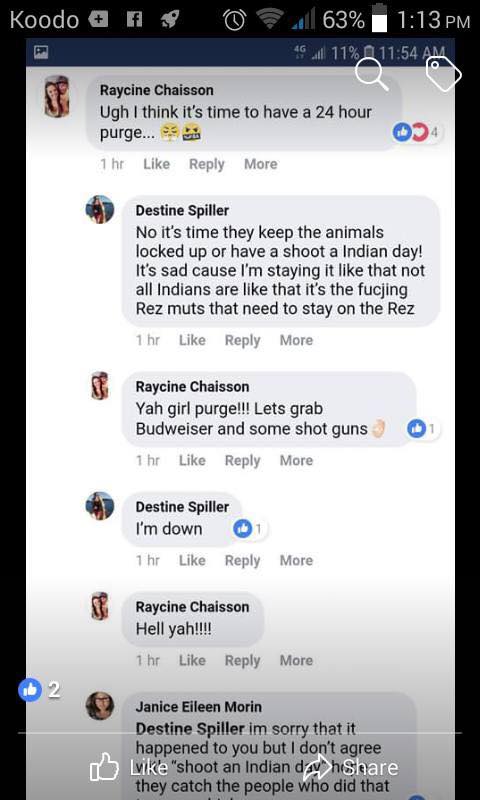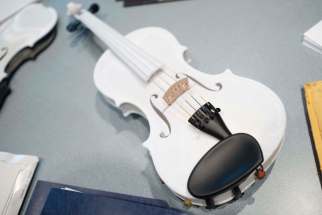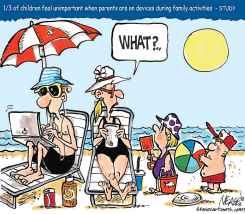The full impact of hurtful words
Read this article for free:
or
Already have an account? Log in here »
To continue reading, please subscribe:
Monthly Digital Subscription
$0 for the first 4 weeks*
- Enjoy unlimited reading on winnipegfreepress.com
- Read the E-Edition, our digital replica newspaper
- Access News Break, our award-winning app
- Play interactive puzzles
*No charge for 4 weeks then price increases to the regular rate of $19.00 plus GST every four weeks. Offer available to new and qualified returning subscribers only. Cancel any time.
Monthly Digital Subscription
$4.75/week*
- Enjoy unlimited reading on winnipegfreepress.com
- Read the E-Edition, our digital replica newspaper
- Access News Break, our award-winning app
- Play interactive puzzles
*Billed as $19 plus GST every four weeks. Cancel any time.
To continue reading, please subscribe:
Add Free Press access to your Brandon Sun subscription for only an additional
$1 for the first 4 weeks*
*Your next subscription payment will increase by $1.00 and you will be charged $16.99 plus GST for four weeks. After four weeks, your payment will increase to $23.99 plus GST every four weeks.
Read unlimited articles for free today:
or
Already have an account? Log in here »
Hey there, time traveller!
This article was published 30/07/2018 (2687 days ago), so information in it may no longer be current.
I’ve never been a fan of the saying: “Sticks and stones may break my bones but words will never hurt me.”
First, broken bones heal. Breaks are not fun to deal with but, sometimes, bones even grow stronger.
Second, words hurt. A lot. They sear, cut, and wound. Sometimes, the damage is permanent.
Anyone called a name knows what I mean. Hurt psyches don’t come back stronger, the skin just grows thicker.
Words also damage more then the receiver. They hurt the deliverer, too.
This was evident last weekend, when three Manitobans lost their positions due to making inflammatory statements that went viral on social media.
The first happened Saturday, after a Canadian Nationalist Party rally at the Belgian Club of Winnipeg. After protesters arrived to confront the CNP’s views, a Belgian Club board member confronted them, saying “I don’t care” about white nationalism, and complained about jobs being lost to “visible minorities.”
The next day, the Belgian Club apologized, announced the board member’s resignation, and promised to review its policies surrounding bookings.
Sunday also was the scene of a Facebook exchange between two Flin Flon residents: Destine Spiller, a hairdresser, and Raycine Chaisson, a substitute elementary teacher.
Spiller, upset that her car had been damaged, posted she was “gunna f—ing kill some Indians when I get home.” and called for “a shoot a Indian day.”
Chiasson suggested a "24-hour purge," referring to The Purge film series, in which all crime, including murder, is permitted for 12 hours.
Activists moved quickly. Within a few hours, both women’s places of employment were contacted. An RCMP report was filed regarding the threatening tone of the post. There was a movement to rate Spiller’s hair salon poorly on the internet.
In response, Spiller wrote on her Facebook page “the post I made earlier wasn’t very nice,” and admitted she spoke “out of anger sorry to who I offended.”
But the damage was done. Spiller was fired. Her former employer apologized in a post, writing: “We have let go the stylist making these comments as we do not tolerate any racism.”
Chaisson faced a similar fate. The Flin Flon School Division issued a statement that it, “Does not tolerate racism or inciting of violence towards any group or people,” and “The individual making the comments is no longer an employee of our division.”
On Monday, the internet was brimming with comments justifying both sides, arguing about political correctness, and a lot of finger-pointing. (See the comment board below this column to see what I mean.)
All this reminds of one important fact: free speech doesn’t mean free from consequence. Words matter, and they last.
All three of these individuals now have a permanent mark next to their names.
Treasurers, hairdressers, and teachers don’t stop their jobs because it’s the weekend. They represent places and people. We all do. Each one of us represents not just the places we work, but the work we do.
These three people are probably not terrible human beings. They do, in my opinion, appear reckless and immature. One thing is for sure: they have exhibited ignorant behaviour that affects real lives in their communities.
No one should be surprised these views exist in Manitoba. (If you are, you just haven’t been listening.)
We don’t need Toronto reporters stopping in for a coffee break and pointing a finger to say we have a racism problem. We shouldn’t be surprised at such words made public this weekend. Nor should we be surprised words lead to actions – and this is why activists take them so seriously.
Words lead to actions. At the worst of this are bullets and bodies.
Whether it’s Canada clearing the plains, or the deaths of its young people, Indigenous communities know words lead to policies and practices. Words like “savages” and “uncivilized” start in mouths and end in the Indian Act, residential schools, and mouldy houses.
What’s new perhaps is these words happen now on social media. (I would garner a guess it’s not more or less, we just hear about hurtful words more.)
Young people experience the outcomes of these words most directly. They face the largest brunt of society’s beliefs, and this violence resides in the deaths of Colten Boushie and Tina Fontaine — incidents which drew national attention.
Stopping this violence, therefore, must necessarily involve words.
Education is one step, but it is not the only one. Cultural awareness training does not solve violence. Not in a school, not in a hairdressing salon, not in a Belgian Club.
Standing up and refusing to participate in violence is how we stop it.
Witnessing violence is when work begins. The real work.
Bravery. Everywhere, whether it be in a police force, a government, or anywhere in society.
Firing people is one response, but it’s the start of a journey, not the end.
The work on eradicating racism is not just on those who receive it. It’s on the deliverers.
That’s how you stop the hurt.
niigaan.sinclair@freepress.mb.ca

Niigaan Sinclair is Anishinaabe and is a columnist at the Winnipeg Free Press.
Our newsroom depends on a growing audience of readers to power our journalism. If you are not a paid reader, please consider becoming a subscriber.
Our newsroom depends on its audience of readers to power our journalism. Thank you for your support.
History
Updated on Tuesday, July 31, 2018 11:23 AM CDT: Corrects attribution of quotes.













